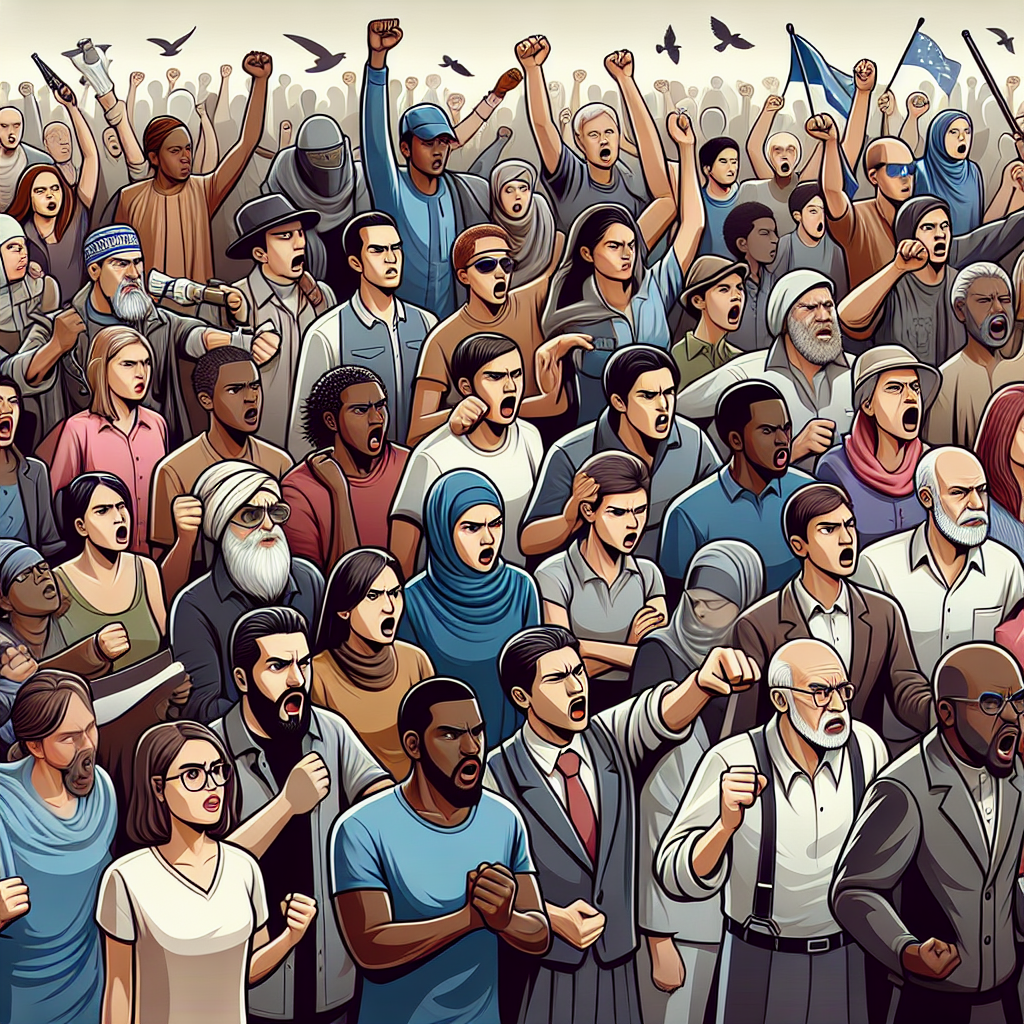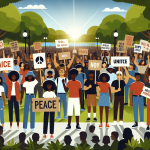The Importance of Dissent in Upholding Justice and Equality
Dissent as a Duty: Exploring the Moral Imperative of Rebelling Against Injustice
Picture this: you’re sitting in a crowded room, surrounded by people who all seem to be nodding in agreement. The speaker at the front is passionately advocating for a policy that you know in your heart is unjust. What do you do? Do you join the chorus of agreement, or do you stand up and voice your dissent? Well, my friend, let me tell you why dissent is not just an option, but a moral duty.
In a world where injustice and inequality run rampant, dissent is the lifeblood of progress. It is the spark that ignites change and the force that pushes society towards a more just and equal future. Without dissent, we would be stuck in a never-ending cycle of complacency, where the powerful continue to exploit the weak and the status quo remains unchallenged. And let’s face it, that sounds about as fun as watching paint dry.
But why is dissent so important? Well, let me break it down for you. Dissent is the voice of the marginalized, the oppressed, and the forgotten. It is the rallying cry of those who refuse to accept the injustices of the world and are willing to fight tooth and nail to make things right. Without dissent, their voices would be silenced, their struggles ignored, and their dreams of a better world crushed under the weight of indifference.
Now, I know what you’re thinking. “But dissent is so uncomfortable! It’s so much easier to just go along with the crowd and avoid rocking the boat.” Trust me, I get it. Confrontation is never fun, and it can be downright terrifying to stand up against the prevailing opinion. But let me tell you a little secret: dissent can also be incredibly liberating. There is a certain power that comes from speaking your truth, from refusing to be silenced, and from challenging the status quo. It’s like a shot of adrenaline straight to the heart, and once you experience it, there’s no going back.
But dissent is not just about individual liberation; it is also about collective action. When one person stands up and says, “Enough is enough,” it inspires others to do the same. It creates a ripple effect that spreads like wildfire, igniting a movement for change. And let me tell you, there’s nothing more exhilarating than being part of a movement that is fighting for justice and equality. It’s like being on a rollercoaster, except instead of screaming in fear, you’re screaming for justice. And trust me, it’s a lot more fun.
So, my friend, the next time you find yourself in a room full of nodding heads, I implore you to be the voice of dissent. Stand up, speak out, and let your voice be heard. Because in a world that is plagued by injustice and inequality, dissent is not just an option, but a moral duty. It is our responsibility to challenge the status quo, to fight for what is right, and to never back down in the face of adversity. So go forth, my friend, and let your dissent be heard. The world is waiting for you.
Examining Historical Examples of Dissent as a Catalyst for Social Change

Dissent as a Duty: Exploring the Moral Imperative of Rebelling Against Injustice
Ah, dissent. The rebellious act of standing up against injustice, the act of saying, “Hey, this is not right!” It’s like the superhero cape of the morally conscious. But have you ever wondered if dissent is just a trendy thing, or if it actually has the power to bring about real change? Well, my dear readers, let’s take a trip down memory lane and examine some historical examples of dissent as a catalyst for social change. And don’t worry, I promise to sprinkle in some humor along the way.
Let’s start with the American Revolution. Picture this: a bunch of colonists, sipping tea and grumbling about taxes. But instead of just complaining, they decided to do something about it. They rebelled against the British rule, and voila! The United States of America was born. Talk about a tea party that got out of hand! But hey, it worked, and now we have the land of the free and the home of the brave. So, next time you’re sipping your tea, remember that it’s not just a beverage, it’s a symbol of rebellion.
Moving on to a more recent example, let’s talk about the Civil Rights Movement. Now, this was a time when people were really fed up with injustice. African Americans were tired of being treated as second-class citizens, and they decided to take a stand. Led by the charismatic Martin Luther King Jr., they marched, they protested, and they made their voices heard. And you know what? They succeeded. Segregation was abolished, and the Civil Rights Act was passed. It just goes to show that sometimes, all it takes is a dream and a catchy slogan to change the world. So, if you’re feeling a bit down about the state of things, just remember that even the smallest voice can make a big difference.
Now, let’s take a trip across the pond to India. Ah, the land of spices and peaceful protests. Mahatma Gandhi, the father of nonviolent resistance, showed the world that you don’t need weapons to fight for justice. With his famous salt march, he challenged the British salt monopoly and inspired a nation to rise up against colonial rule. Talk about a pinch of rebellion! Gandhi’s peaceful methods proved that sometimes, the pen (or in this case, the salt) is mightier than the sword. So, next time you’re cooking up a storm in the kitchen, remember that even the simplest ingredient can pack a powerful punch.
Last but not least, let’s talk about the women’s suffrage movement. Ah, the fight for equality. Women all over the world were tired of being treated as second-class citizens, and they decided to do something about it. They marched, they protested, and they demanded their right to vote. And you know what? They won. It just goes to show that sometimes, all it takes is a little bit of girl power to change the world. So, next time you’re feeling a bit underestimated, just remember that behind every great man is an even greater woman, ready to kick some butt.
So, my dear readers, as we’ve seen from these historical examples, dissent is not just a duty, it’s a moral imperative. It’s the spark that ignites change, the voice that refuses to be silenced. So, the next time you see injustice, don’t just sit there and grumble. Stand up, speak out, and let your dissent be heard. After all, as history has shown us, even the smallest act of rebellion can have a ripple effect that changes the world. And hey, if all else fails, at least you’ll have a good story to tell.
The Ethical Responsibility of Individuals to Speak Out Against Injustice
Dissent as a Duty: Exploring the Moral Imperative of Rebelling Against Injustice
Picture this: you’re sitting at a dinner party, sipping on your wine, when suddenly someone makes a comment that is so outrageously offensive, you can’t help but choke on your hors d’oeuvre. What do you do? Do you politely smile and pretend you didn’t hear it? Or do you stand up, slam your glass on the table, and declare, “I dissent!”?
Now, I’m not suggesting that every dinner party should turn into a battleground of ideologies. But there is something to be said about the ethical responsibility of individuals to speak out against injustice. In a world where injustice runs rampant, dissent becomes not just an option, but a duty.
Let’s face it, folks. Injustice is everywhere. It’s like that annoying relative who shows up uninvited to every family gathering. You can’t escape it. It’s in our schools, our workplaces, and even in our own homes. And if we don’t speak up, who will?
But why is it our duty to dissent? Well, for starters, injustice thrives in silence. It feeds off our apathy and thrives on our indifference. By speaking out against injustice, we are not only challenging the status quo, but we are also giving a voice to the voiceless.
Think about it this way: if you were being treated unfairly, wouldn’t you want someone to stand up for you? Of course, you would! And that’s exactly why dissent is so important. It’s about standing up for what is right, even when it’s not popular or convenient.
Now, I know what you’re thinking. “But dissent is so uncomfortable! It’s so much easier to just go with the flow and avoid confrontation.” Trust me, I get it. Confrontation is about as enjoyable as a root canal. But sometimes, discomfort is necessary for change.
Imagine if Rosa Parks had just quietly moved to the back of the bus. Imagine if Martin Luther King Jr. had decided to keep his dreams to himself. Where would we be today? Certainly not where we are now. It took their dissent, their refusal to accept the status quo, to ignite a movement that would change the course of history.
But dissent doesn’t always have to be serious and somber. In fact, it can be downright hilarious. Take, for example, the satirical genius of Jon Stewart. With his sharp wit and biting humor, he has managed to expose the absurdity of our political system and hold those in power accountable. And let’s not forget about the power of a well-crafted meme. In the age of social media, dissent has taken on a whole new level of creativity.
So, my friends, the next time you find yourself face to face with injustice, remember that dissent is not just an option, but a duty. It’s about standing up for what is right, even when it’s uncomfortable. It’s about giving a voice to the voiceless and challenging the status quo. And who knows, maybe one day, your dissent will be the spark that ignites a revolution.
Conclusion
In conclusion, dissent can be seen as a moral imperative when faced with injustice. It is the duty of individuals to challenge and rebel against unjust systems and practices in order to bring about positive change. By speaking out and taking action, dissenters can contribute to the advancement of justice, equality, and human rights. However, it is important to note that dissent should be exercised responsibly and ethically, with a clear understanding of the potential consequences and a commitment to non-violence. Overall, dissent serves as a crucial tool in the pursuit of a more just and equitable society.






